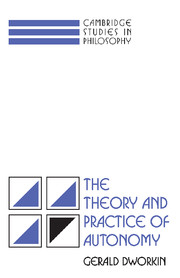2 - The value of autonomy
Published online by Cambridge University Press: 05 June 2012
Summary
I have outlined a conception of autonomy; a conception that is in various ways different from other conceptions of autonomy that have historically been developed. One way of attacking such a conception is by arguing that it does not fulfill the evaluative tasks that have traditionally been associated with the notion. In this chapter I wish to defend the conception developed in Chapter 1 against a certain attack and then to argue for the value of exercising autonomy when understood in this way.
There is a traditional view of autonomy that must view my conception as too thin to be of value because there is no specific content to the decisions an autonomous person takes. Suppose we have a person who has not been subjected to the kinds of influence – whatever they turn out to be – that interfere with procedural independence. Suppose the person wants to conduct his or her life in accordance with the following: Do whatever my mother or my buddies or my leader or my priest tells me to do. Such a person counts, in my view, as autonomous. But has not such a person clearly forfeited autonomy? Must autonomy involve a particular content, a substantive and not merely procedural independence from others?
I shall argue that the conception of autonomy that insists upon substantive independence is not one that has a claim to our respect as an ideal.
- Type
- Chapter
- Information
- The Theory and Practice of Autonomy , pp. 21 - 33Publisher: Cambridge University PressPrint publication year: 1988
- 3
- Cited by



